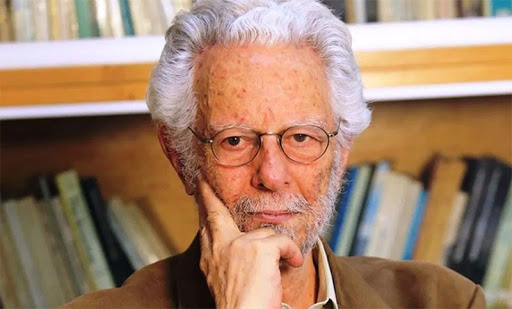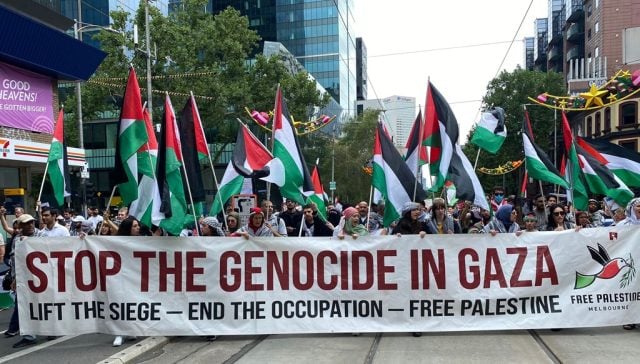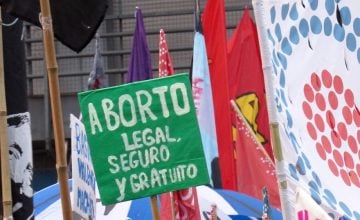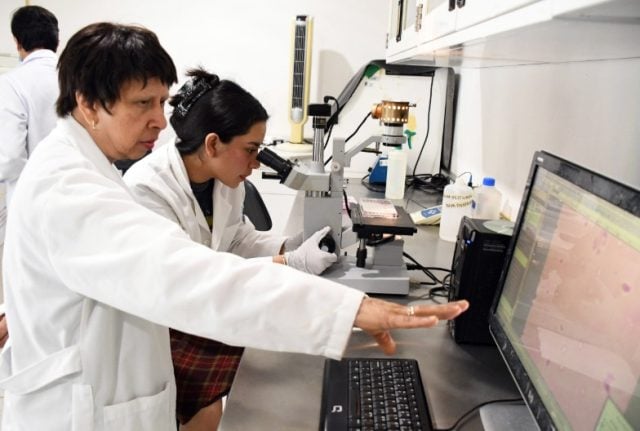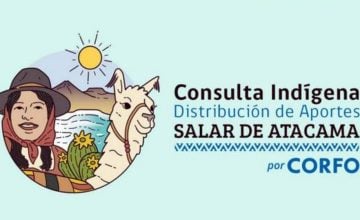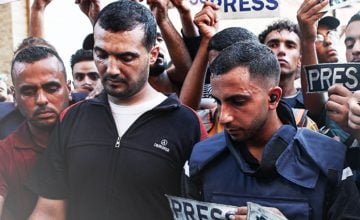Enrique Dussel, academic and philosopher, considers that Latin America is in a process that he calls the second emancipation. In addition, he envisions a world moment of ‘passage’ of a hegemony that is breaking down and is already collapsing, such as that of the United States.
In an interview with El Ciudadano in a new chapter of Mexico Decide 2021, led by Denis Rogatyuk and Francisco Herrera, he analyzed the panorama of the Morena political party Morena, ahead of the elections on June 6, and the role of President Andrés Manuel López Obrador in the Mexican transformation process.
«López Obrador emerged saying ‘I am president elected by a people, like you, Mr. President of the United States, we are at the same level, and we speak as equals, not as colonies’ and he made himself respected by (Donald) Trump, it is remarkable, and so a ‘wall’, which is México, has risen that is protecting Latin America from the US. It is the first time, in the 21st century, that a new Mexico has emerged and it will fulfill a very important function if the Fourth Transformation deepens”, he stressed.
By Denis Rogatyuk and Francisco Herrera
DR: How do you evaluate the first two and a half years of the government of Andrés Manuel López Obrador? Do you think it is a government of the left with the potential to change Mexico or simply a reformist government?
ED: The categories sometimes fail because talking about reform seems to oppose the Revolution, and then to say that he is a reformist is to say that he is not a revolutionary, but those traditional categories I think are not valid at this time because of the world geopolitics, because of the particular Latin American and Mexican situation.
I am envisioning that we are in a world moment of ‘passage’ of a hegemony that is breaking down, that is already collapsing, of the United States, which does have a military priority, but which has lost the industrial and ‘ideological creation’ that it had held since 1945 being hegemonic in world history.
The presence of China and India, which is beginning to develop, gives a balance between the West and the East, we are in that struggle, this is the distant horizon. The second horizon is that Latin America is in a process that I called the second emancipation. José Martí and (José) Carlos Mariátegui spoke that the first emancipation was made in the 19th century from Spain and Portugal, but as Martí had been in the United States, he realized that the new power was the United States, and the emancipation of Spain (the first emancipation) gave rise to a neocolonialism where after the Second World War the United States gains hegemony and domination in Latin America. Since the coup in Nicaragua, by (Carlos) Castillo Armas, a stronger North American presence begins.
I think we are in the fight for the second emancipation, not from Spain but from the United States, and not for the whole world but for Latin America in a very special way. Asia was never a neo-colony because of the density of its inhabitants, China, India; the Islamic world because of the power of its financial capital based on oil; Bantu Africa in a very different situation because it became a colony much later and it liberated itself after the Second World War and failed to constitute the national State.
Latin America has two centuries of constitution of national States, but now there is this struggle between the United States and China as an opportunity for the second emancipation. So, since the coup in Nicaragua in 1959, other processes have taken place, the first in Cuba, which is the first to rise up against the United States, then comes the Chilean socialism of (Salvador) Allende, then the Sandinismo, then Farabundismo, Zapatismo, and also the already nationalist occupation with Hugo Chávez and its continuity. Suddenly in Argentina there was Kirchnerism, in Bolivia there was Evo Morales, there was the socialist left, in its own way, in Chile and in Uruguay, Lula in Brazil, and the progressive movements occupied Latin America in a first wave.
Then there was a reaction, that was the coup in Bolivia, the presence of (Sebastián) Piñera in Chile, a regrouping of the neoliberal right but without a project, and then, very soon, those governments, the Chilean, in Argentina with (Mauricio) Macri, (Jair) Bolsonaro in Brazil, are exhausted and we are in the second wave of this process of independence from the United States, in a geopolitical situation with a Latin America that is absolutely different from the other blocks, Africa, Asia, Europe, the United States.
We are in the struggle for the second emancipation, and now with the election in Chile, the example of a neoliberal project that (Augusto) Pinochet started in 1973 with the ‘Chicago Boys’ has concluded and this has a very strong significance for Latin America. It means that the new popular, non-populist governments begin to grow and in the face of Bolsonaro’s fall, when the Brazilian leader (Lula) can rise again, together with Arce in Bolivia, together with Peronism in Argentina, Andrés Manuel López Obrador is added, which is an unexpected situation, because when Brazil has Lula again, Argentina with a Kirchnerist movement and Mexico with Andrés Manuel López Obrador, and Bolivia with Arce, succeeding the previous revolution, and the resistance offered by Cuba and Venezuela, we are in a situation of fundamental geopolitical change.
So, these new governments of the second emancipation do not fit any traditional European denomination, they are not social democrats at all, they are not populists in the sense of (Margaret) Thatcher or (Donald) Trump, they are popular non-populists, they are not Socialists such as (Salvador) Allende or Cuba or the intention of Hugo Chávez, they are nationalists for independence, who are offering resistance to the United States. It means that we are facing a reality that demands new categories in the history of the ideology of the progressive processes of the left, nationalist in some way and popular, but not as a revolutionary or reformist denomination, but rather it has to do with new categories and within that context Andrés Manuel López Obrador is a practitioner rather than a theoretician and he is leading the Government of Mexico with great prudence, in connection with the grassroots movements of the people and opposing the neoliberal project.
At a very key moment, there is an election in three weeks, if he (López Obrador) achieves a majority in the Senate and in the Chamber of Deputies, he will have three years to be able to accentuate many anti-neoliberal measures, but not as an alternative project to neoliberalism because he does not have an economic project for now. It will be necessary to formulate it slowly, then the situation is extremely complex and requires new categories to understand what is happening and in this situation I say that we have to start to see this reality.
That Marx, for example, is valid but it is not a class struggle, it is a struggle of popular groups against an elite that depends on the United States, then the word ‘people’ comes to replace the category ‘class’ and then, new movements emerge, the workers and of course traditionally, and the peasants who have become much more active, but now there are very strong feminist movements, an indigenous movement, an anti-racial movement, as seen in Bolivia in the coup d’Etat organized by the OAS that lasted very little because it had no project and what it did was to ‘sink’ the country, and in a year, it no longer had any more to steal from and it fell, and then Evo Morales returned, but in the figure of Arce who is the economist of the group and the one who really has more clarity on these points.
We are facing that certainty, but I would say very positive, because the movement led by the United States, which the ‘Chicago Boys’ proposed, neoliberalism, and imposed it on Chile has failed and the people are already aware because it means accumulation of wealth in the hands of very few and they said that later it was going to ‘rain’ on the people, nothing has ‘rained’ on the people, they (the very few) have concentrated the wealth and what they have left in the country is poverty and the people have already seen it.
I am optimistic and Mexico, for the first time, since 1910, has entered the process of change. When I hear about Lula in Brazil, Cristina) Fernández in Argentina, it will be the first time in history that the three countries are going to begin to change the Latin American physiognomy, but we need a new ‘intelligence’ that captures what is happening, it is not Traditional Marxism, neither is it a simplistic, populist demagoguery, it is not a social democracy, because for social democracy it would be necessary to have a Marxist left that would pretend to govern but it does not exist, and so, that’s the situation we have.
FH: You speak of a crisis of representative democracy, where the candidates are chosen by an elite and the people simply have to confirm this decision. Was López Obrador’s victory two and a half years ago a change for that type of system?
ED: Yes, what happened is that the United States and the French Revolution invented representative democracy, but the representative is elected by an elite, be it like a party policy, and above all supported by the great capital that has accumulated a lot of wealth, with which it can buy television time, newspapers, radios, and advertise.
That is the current situation, that an elite elects the representatives and the people, what it does is confirm the representatives that the elite has chosen, and the United States is a representative democracy that does not express the people but the political and economic elite that imposes the candidates to be voted.
The crisis is in the representative democracy, what must be done is to institutionally articulate, for the first time, a participatory democracy, which is articulated with the traditional representative one, and that is something that Venezuela has in its Constitution, it gives power to the citizens (Citizen Power), and it has five powers, the Executive, Legislative, Judicial, Electoral, which decides on elections, but is directly elected by the people, and the Participatory Power, where now it must give participation from the grassroots to the people, not with professional politicians, but with real representation that can put representative institutions in trouble.
Venezuela conceived a State different from that of the French Revolution, the modern State, and it makes a State of another type, where there is more popular participation, where the people choose the Electoral Power because the electoral decision is very important, but that is chosen by the people, not by the Executive Power and the Legislative, and there is also a Citizen Power at the base, in the small population units that are later coordinated in more complex bodies to have a real presence, with power, with the police, with the possibility of auditing the other powers, even the representatives.
So, we have to conceive a State, not to annul the State as anarchism says, but to empower the State so that the people can defend it from the empire of the United States. An empowered State that administers what is common to all, oil, gas, mines, water, all that is property of the State, of the people through the strong State, but not an authoritarian State, a participatory one of the base (of the people), not of the representation.
We need to conceive a new type of State and, in that sense, we gradually discover what are the mechanisms of the representative (State) dependent on the United States, dominated by big capital and by capitalism, which cannot immediately be overcome in a revolutionary process, but it will be necessary to transform the economy slowly without being reformist or social democratic. These are complex issues.
In such a way, that it would be a government of the left, popular, of grassroots participation, and that has clarity of being able to domesticate and direct big capital and capital based on criteria of social justice and preventing the corruption of that political elite that think of their own enrichment and not in the benefit of the people.
Mexico is a spectacular example of corruption and the State must be cleaned up, strengthened, but allowed to institutionalize its presence by the people.
FH: Do you feel that if there is a defeat in the elections on June 6, all this possibility of change will be put on hold?
ED: If Morena does not achieve a majority in both chambers, the whole process will go much slower, and it is serious. It must achieve an absolute majority to finish making substantive reforms in the last three years, and among them, I think, the issue has not yet been discussed, a new Constitution of the Venezuelan type.
There has been no talk because you have to have a majority to be able to achieve that, in this vote, it is key, and a lot of the possible success is being played there. In any case, there has been an enormous advance, but it can be reversed if there is no majority.
They have all united against López Obrador, the PRI, the right, the PAN, and the old left political party, the Democratic Revolutionary Party, and they have made a purely electoral pact to prevent that majority. It is a danger, and it is a possibility that would slow down the process, and since Morena is still very weak in terms of its organization, and there is an electoral system of the old regime that is intervening, preventing Morena from really forming and that has intervened in the life of the party above all legality and the party has admitted it.
I think that intervention has been done in an excessive way, it should not have allowed so much intervention of what here is called the INE, (the National Electoral Institute), and a judicial court that has interfered in the internal life of the party and has violated the party’s own statute to confuse the process.
Morena is too young and I think it has not defended itself enough, but everything could advance if people support Morena. Of course there is propaganda, newspapers, radios, television, all in the hands of the great national capital, not only North American, which do not want to lose power. It is now a matter of whether the people really understand that the ‘presence of the people’ is very serious to maintain the majority in both houses, of deputies and senators, in order to really make a more thorough transformation. The first, a new electoral law and, second, a new Constitution to give another form to the State and allow the participation of the people.
DR: The constitutional change in Mexico, do you see it as essential for systematic change and as part of the Fourth Transformation? In what way do you think that other processes, such as Chile’s, can influence this change?
ED: The three strongest changes that have occurred in Argentina, in Ecuador, and especially in Venezuela, made a constitutional change, and I believe that we must reach that point so that the construction of the Fourth Transformation can continue, if that is not possible, the fight is postponed and it will take longer, and the fight will continue, even if there is no new Constitution, and it will be achieved in the future. That is the process of coming and going of the second emancipation now with the United States, so that Latin America ceases to be the ‘backyard’ of the US and is transformed into another country (not colony), together with the United States, which at the time may need the support of Latin America because three hundred million inhabitants are too few compared to the fourteen hundred in China and Europe itself, which are almost six hundred million.
So, the United States would need Latin America, not as a place of exploitation and enrichment, but as allies for the geopolitical struggle. It would have to change.
So, in the Constitution everything is not at stake, it is one more element and it would be very good, because the electoral system would have to be changed so that it is truly democratic, it will not be less democratic, it would be more democratic, beyond the French Revolution and the Philosophy of the US Constitution, with the institutionalized participation of all the people, this supposes a new Constitution, but if it does not happen, the struggle will continue because there will be no solution. Then this can last ten years, twenty years, thirty.
The second emancipation is going to last a long time, it began with Cuba in 1959 and we have already been in this process for half a century, and it may last even longer. The first emancipation began with Túpac Amaru in Peru in full colonial times, which began the liberation from Spain in 1780 and finally took place in 1823, in Ayacucho when it ended. It was almost fifty years, so you have to think about the medium and long term, and not to think that here, there is an instantaneous Revolution, as it was thought before that one day we were something and the next day we are the ‘new man’. No, this is going to be slower, and there are going to be ups and downs, and we have to think of a strategy of how to make defeats a success, what Chile has now done and what is happening in Colombia and Brazil, that all is not lost, but, on the contrary, the people understand that they can be the agents of something new.
That those who govern do not provide solutions or have projects but destroy what little there was, and then, the popular movements become more aware, but the ‘intelligence’, that is, the thinking minority, must clearly formulate what the new State is going to be about, as well as the new order of things, and at the same time, what are the major reforms to a Constitution analogous to the French Revolution, beyond it, and that is a very great responsibility that we now have on our hands.
DR: Do you see the need for the Latin Americanization of the change process here in Mexico through some international forums and political connections with the continent, through some instruments such as the Celac or new forums that should be developed?
ED: The Clacso and many other institutions. Mexico is now transformed into a Latin American reference because there was a moment, fifteen years ago, when there was a meeting of intellectuals from Latin America in Mexico. There were one hundred and fifty institutions that were studying Latin America in Mexico, and Mexico became the ‘thinking center’ of all of Latin America. Before, it had been Chile, but with Pinochet it ended, and many intellectuals came to Mexico, and people are now beginning to feel Latin America, and the Colombian problem is felt as their own by the people on the street, the Chileans too, the Argentines.
The person the president of Mexico invites first is the president of Argentina, (Alberto) Fernández, who is a Kirchnerista, who thinks a lot like López Obrador, but does not have the experience of exercising politics that now López Obrador has acquired, Fernández has much to learn from López Obrador, but he (Obrador) does not leave Mexico, he does not need to, but he is beginning to be a light in the foreign policy of all Latin America and even worldwide, because it says non-intervention. It seems that it is to exclude himself from the processes, but no, it is to criticize the US interference in the countries. He is very critical of the United States when speaking of non-intervention, that is the traditional policy of Mexico but seriously now.
Since 1910, México had chaotic governments at the beginning, with (Lázaro) Cárdenas a nationalism was discovered that allowed the possession of oil, gas, mines, and it ‘expelled’ US capital, but little by little the PRI was dissolved and transformed into a US lackey, and the US despised it (the ‘lackey’ PRI) because it really said amen to everything the US did.
López Obrador emerged saying I am president elected by a people, like you, Mr. President of the United States, we are at the same level, and we speak as equals, not as colonies and he was respected by (Donald) Trump, it is remarkable. And now, he has to make himself respected by the new president and so, a ‘wall’, which is México, has risen that is protecting Latin America from the US. It is the first time, in the 21st century, that a new Mexico has emerged and it will fulfill a very important function if the Fourth Transformation deepens. If the Fourth Transformation fails or is diluted, the process will take longer, but the process will be done because the people cannot endure suffering for so long.
